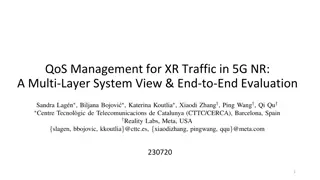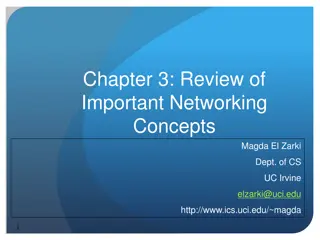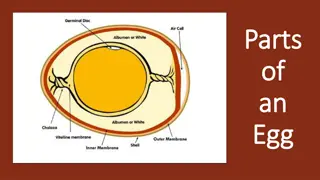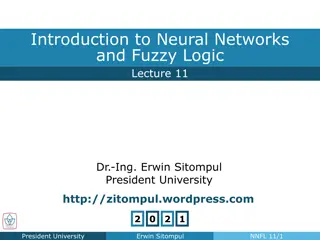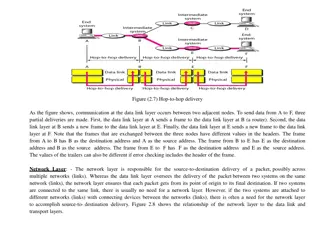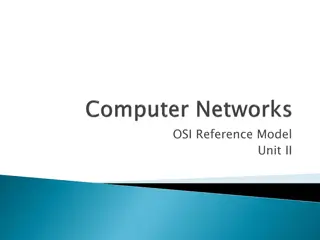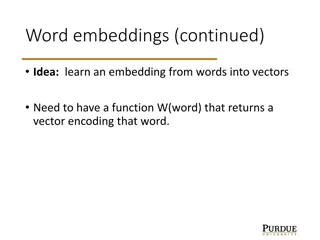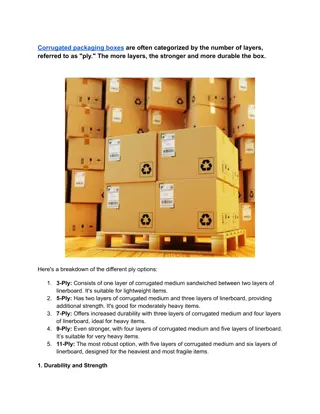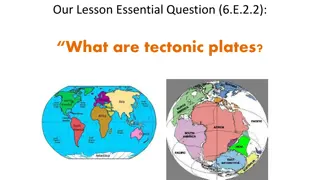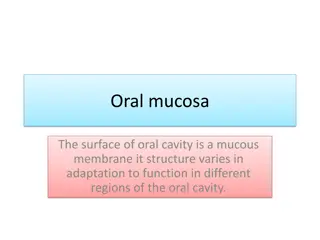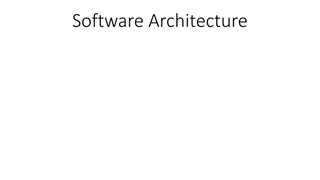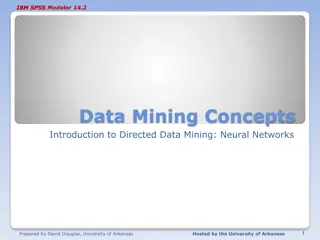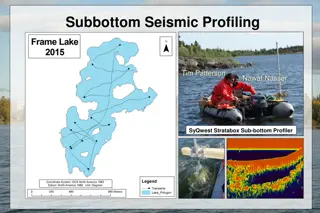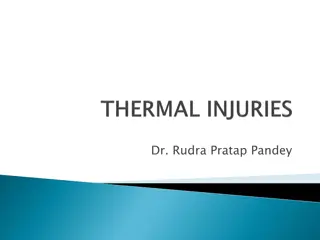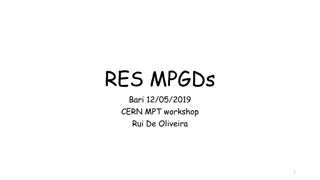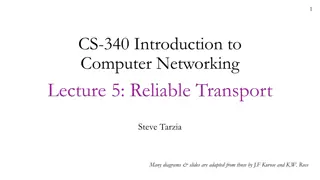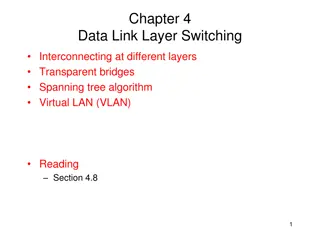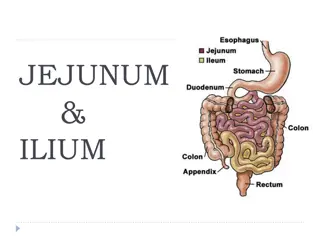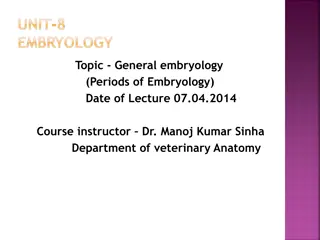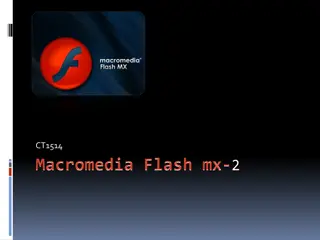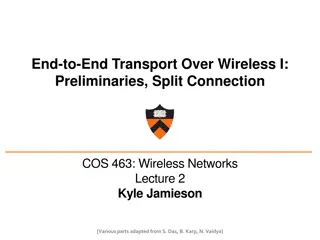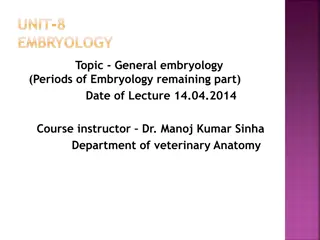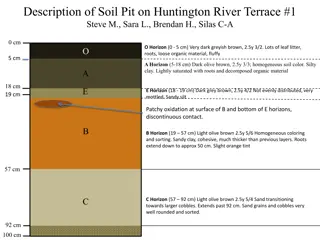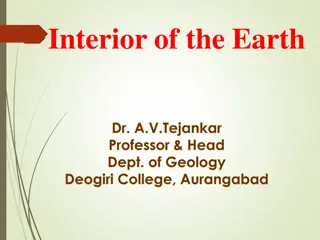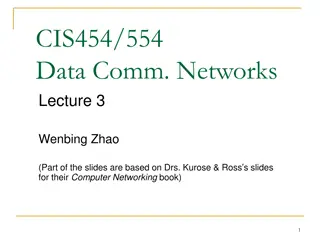Scale Based Regulation 2023 - Non-Banking Financial Company (NBFCs)
On October 19, 2023, the Reserve Bank of India (\u201cRBI\u201d) has issued \u2018Master Direction \u2013 Reserve Bank of India (Non-Banking Financial Company \u2013 Scale Based Regulation) Directions 2023\u2019 (\u2018SBR Master Direction\u2019). The SBR Master Direction aims to harmonize the Previ
0 views • 9 slides
5G NR Traffic QoS Management: Multi-Layer System View & End-to-End Evaluation
5G NR technology emphasizes enhanced QoS for XR traffic, including AR, VR, and Cloud Gaming. This research delves into handling QoS for XR/CG traffic at various layers, proposing QoS control mechanisms at the application and MAC layers, along with an evaluation of these approaches using a simulator.
6 views • 14 slides
Important Networking Concepts Overview
Review essential networking concepts including protocol architecture, protocol layers, encapsulation, network abstractions, communication architecture, and TCP/IP protocol suite. Understand the functions of different layers in networking for reliable data transfer and communication efficiency.
3 views • 43 slides
An In-Depth Look at the Parts of an Egg
Explore the various components that make up an egg, from the protective shell to the germinal disk containing genetic material. Learn about the roles of the membranes, albumen, yolk, chalaza, and more in this informative visual guide. Follow along with descriptions and images to deepen your understa
1 views • 11 slides
Understanding Epithelial Tissues: Types and Characteristics
Epithelial tissues are integral to the human body, forming sheets of cells that cover internal and external surfaces. Derived from all three primary germ layers, epithelia exhibit distinct polar characteristics and rely on connective tissue support. There are two main types of epithelial tissues –
1 views • 16 slides
Understanding Mutations: Types, Characteristics, and Examples
Mutations are changes in the genetic material that can affect an organism's traits. This article explores gene mutations, their historical background, characteristics, kinds of mutations like spontaneous and induced, somatic and germinal mutations, and conditional lethal mutations. It also covers ge
0 views • 18 slides
Understanding Multi-Layer Perceptrons in Neural Networks
In this lecture by Dr. Erwin Sitompul at President University, the focus is on Multi-Layer Perceptrons (MLP) in neural networks, discussing their architecture, design considerations, advantages, learning algorithms, and training process. MLPs with hidden layers and sigmoid activation functions enabl
2 views • 17 slides
Understanding OSI Model and TCP/IP Protocol Suite
Explore the concept of layering in data communication, comparing the OSI model and TCP/IP protocol suite. Learn about protocol layers, protocol hierarchies, and the functionality of each layer in these models. Discover the interrelationships between layers and the evolution from OSI to TCP/IP.
5 views • 57 slides
Understanding Communication Layers in Computer Networks
Communication in computer networks is facilitated through different layers such as the data link, network, and transport layers. Each layer has specific responsibilities in ensuring data delivery from one point to another. The data link layer handles communication between adjacent nodes, the network
3 views • 7 slides
Understanding OSI Reference Model Layers
The OSI (Open Systems Interconnection) model consists of 7 layers, each with specific functions in network communication. From the Application layer handling user services to the Physical layer dealing with data transmission, learn about the responsibilities and interactions of these layers in netwo
0 views • 26 slides
Understanding OSI Model and TCP/IP Protocol Suite in Computer Networking
This chapter explores the OSI model and TCP/IP protocol suite, delving into protocol layers, addressing mechanisms, and network components. It highlights the interface between layers, functions of each layer in the OSI model, and compares TCP/IP protocol suite layers with OSI model layers. The discu
0 views • 30 slides
Understanding Word Embeddings in NLP: An Exploration
Explore the concept of word embeddings in natural language processing (NLP), which involves learning vectors that encode words. Discover the properties and relationships between words captured by these embeddings, along with questions around embedding space size and finding the right function. Delve
0 views • 28 slides
Heavy Duty shipping shifting master Corrugated packaging Box, available in (3-ply, 5-ply, 7-ply, 9-ply, 11-ply)
Corrugated packaging boxes are often categorized by the number of layers, referred to as \"ply.\" The more layers, the stronger and more durable the box.
1 views • 2 slides
Understanding Tectonic Plates and Earth's Layers
Explore the composition of Earth's layers through classifying them based on chemical and physical properties. Learn about the lithosphere and its role, including the movement of tectonic plates on the asthenosphere. Discover the distinctions between oceanic and continental plates, their thickness va
1 views • 22 slides
Understanding Oral Mucosa: Structure and Classification
The oral mucosa is a mucous membrane that adapts to different functions in various regions of the mouth. It is classified into masticatory, lining, and specialized mucosa, each with distinct characteristics. The structure of oral mucosa resembles skin and consists of epithelium and connective tissue
3 views • 31 slides
Understanding Software Architecture Patterns
Software architecture refers to the high-level structures of a system, including architectural patterns that provide reusable solutions to common problems. Architectural patterns like Layered, Client-server, and Master-slave help in breaking down large systems for better management and maintenance.
5 views • 33 slides
Introduction to Neural Networks in IBM SPSS Modeler 14.2
This presentation provides an introduction to neural networks in IBM SPSS Modeler 14.2. It covers the concepts of directed data mining using neural networks, the structure of neural networks, terms associated with neural networks, and the process of inputs and outputs in neural network models. The d
0 views • 18 slides
Understanding CMOS Layers and Interconnect Design in Semiconductor Manufacturing
This content provides detailed insights into the CMOS layers, n-well process, p-well process, twin-tub process, metal interconnect layers, gate design, and layout strategies involved in semiconductor manufacturing. Explore the images and descriptions to grasp the complexities of MOS arrays, gate con
0 views • 27 slides
Understanding the Layers of the Ionosphere
Explore the layers of the ionosphere including the D, E, Es, and F layers and how they impact radio wave propagation. Discover how solar activity affects ionization levels and skip distances, offering insights into long-distance communication potential. Learn about the influence of solar radiation o
0 views • 19 slides
Investigating Immiscible Fluids: Layers Formation and Interface Motion
The report explores the formation of layers in a beaker containing immiscible fluids such as water and vegetable oil. It delves into the theoretical and experimental aspects, discussing the chemical properties, layer creation limits, interface motion upon disturbance, and the strengths and weaknesse
2 views • 6 slides
Environmental Impact Assessment of Frame Lake and Recommendations
The subbottom seismic profiling and stratigraphy studies reveal the sediment layers in Frame Lake and the impact of urban development on water quality. Glew coring analysis identifies layers of arsenic contamination. Recommendations include dredging to restore the lake's natural state pre-1975. The
0 views • 13 slides
Overview of Burn and Scald Injuries and Classification
Burn injuries from dry heat and scald injuries from hot liquids or steam are common forms of thermal injuries. Other etiological classifications include exposure to chemicals, electrical energy, and radiation. The extent of tissue damage is directly related to temperature and duration. Classificatio
1 views • 31 slides
Understanding Oil Market Dynamics in Turbulent Times
This presentation by Dr. Bassam Fattouh at the G20 Conference in 2013 delves into the complexities of the oil market, including the speculation versus fundamentals debate, inter-linkages between physical and financial layers, and the role of expectations in oil price formation. The discussion also c
0 views • 9 slides
Innovative Resistive Layers and Structures for Particle Detection at CERN
Explore the latest advancements in resistive layers and structures designed for particle detection at CERN. The research covers various types of resistive structures, including GEM and BULK Micromegas, and delves into topics such as spark protection, energy levels, and material vaporization. Detaile
0 views • 39 slides
Understanding Reliable Transport and User Datagram Protocol in Computer Networking
This content covers the concepts of reliable transport in computer networking, including the reliable transport layer protocols like TCP, UDP, and the basics of Domain Name Service (DNS). It explains the layers of the Internet, the functions of each layer, and the differences between TCP and UDP pro
0 views • 28 slides
Understanding LAN Interconnection and Switching Technologies
This content delves into the concepts of interconnecting LANs, exploring the reasons and methods behind partitioning LANs and interconnecting them at different layers using repeaters, hubs, bridges, switches, and routers. It also highlights the differences between these devices in terms of their net
0 views • 21 slides
Overview of Jejunum and Ilium Histology and Vascular Supply
The jejunum and ileum are segments of the small intestine with distinct features in terms of position, diameter, wall thickness, and lymphoid aggregates. They receive arterial blood supply from branches of the superior mesenteric artery and drain into various venous tributaries. Histologically, the
0 views • 14 slides
Understanding Racism: Unveiling Layers of Injustice
Explore the interconnected layers of racism - from internalized beliefs to institutional discrimination - through the lens of events like the Michael Brown shooting in Ferguson. Delve into the roots of racism, its impact on society, and ways to address systemic injustices.
0 views • 13 slides
Embryology: Stages of Development and Gestation Period in Different Animals
Embryology covers the Germinal, Embryonic, and Fetal stages of development in animals, highlighting processes like cleavage and formation of morula. Additionally, it provides insights into the gestation periods of various animals ranging from cows and mares to humans and elephants, each with its uni
0 views • 16 slides
Mastering Motion Guide Layers for Advanced Animation
Dive into the world of Motion Guide Layers to control object movement in animation projects. Learn how to create, use, and manipulate Motion Guide Layers effectively, along with tips on leveraging mask layers for spotlight effects and transitions. Discover techniques for grouping objects and creatin
0 views • 16 slides
Understanding Layering in Wireless Networks
This content delves into the concept of layering in wireless networks, highlighting the motivation behind layering, the Internet's approach to avoiding reimplementation for each underlying medium, the role of intermediate layers in providing abstractions, properties of network layers, and the functi
0 views • 53 slides
Understanding General Embryology: Germinal Layers and Organ Formation
General embryology covers the development of organs and tissues from the three germinal layers - ectoderm, mesoderm, and endoderm. Ectoderm gives rise to the nervous system and body covering, mesoderm forms skeletal tissue and muscles, while endoderm forms the gut lining. Derivatives of each layer i
0 views • 10 slides
Early Life Intervention Diminishes Sjögren's Syndrome Manifestations in Mice
Early life intervention has been shown to reduce the clinical manifestations of Sjögren's syndrome in NOD.H-2h4 mice, which mimic key features of the human autoimmune disease. The syndrome is characterized by salivary gland autoantibodies, ectopic lymphoid follicles, reduced salivary and tear flow,
0 views • 19 slides
Detailed Descriptions of Soil Pits on Huntington River Terrace
The soil pits on Huntington River Terrace provide detailed insights into the soil composition at different depths. Terrace #1 exhibits dark greyish-brown to light olive-brown layers with varying textures, while Terrace #2 showcases well-sorted clay and gravel transitions. Terrace #3 presents a mixtu
0 views • 4 slides
Understanding OSI Model and TCP/IP Protocol Suite in Computer Networking
This content delves into the OSI model and TCP/IP protocol suite, highlighting the protocol layers, addressing mechanisms, and communication scenarios. It explores the functions of each layer, the interface between layers, and compares the TCP/IP layers with the OSI model. Through examples and illus
0 views • 46 slides
Journey to the Earth's Layers
The Earth's structure consists of four main layers: the crust, mantle, outer core, and inner core. The crust is the thin, rocky layer we see on the surface, while the mantle is a solid layer that flows like a viscous liquid. The outer core is a hot, melted layer of iron and nickel, and the inner cor
0 views • 10 slides
Journey to the Center of the Earth: Unveiling the Layers
Delve into the depths of the Earth with Dr. A.V. Tejankar to explore the three main layers - Crust, Mantle, and Core. Discover how the Earth's composition and physical properties vary across these layers, resembling the layers of an egg. Uncover the secrets of the Earth's interior, from the thin but
0 views • 15 slides
Exploring Earth's Interior: Layers, Structure, and Seismic Waves
Explore the dynamic layers of Earth's interior, from its three major layers formed by gravity and chemical segregation to mineral and phase changes in the mantle. Discover how seismic waves provide insights into the planet's composition as they interact with different layers, reflecting and refracti
0 views • 50 slides
Understanding Tropical Cyclones and Layers of the Atmosphere
Tropical cyclones are warm-core low-pressure systems that form over oceans with high sea surface temperatures. The Philippines is prone to these cyclones, leading to heavy rains, flooding, and strong winds. The layers of the atmosphere, from the exosphere to the troposphere, play crucial roles in sh
0 views • 7 slides
Understanding Protocol Layers in Computer Networking
Explore the concept of protocol layers in computer networks for organizing the structure of complex systems. Learn about the organization of network functionality similar to air travel processes and the benefits of layering in dealing with complex systems. Delve into the Internet Protocol Stack, hig
0 views • 29 slides

